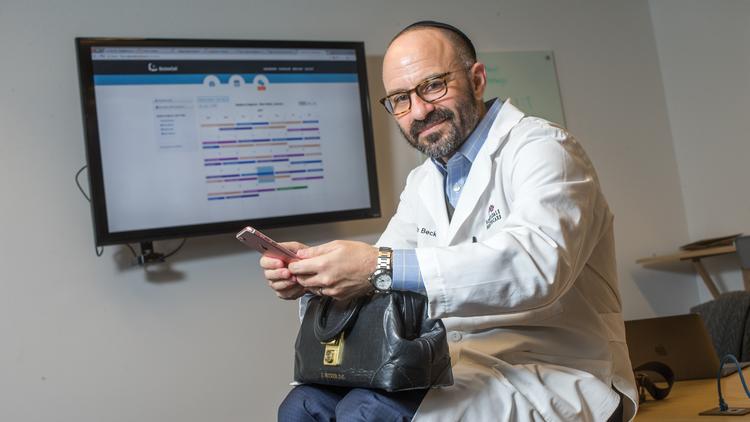 Posted by Dr. Becker on Sep 25, 2017 11:39:06 AM
Posted by Dr. Becker on Sep 25, 2017 11:39:06 AM

I’ve heard physicians compared to zombies with stethoscopes.
Lifeless, going through the motions, burnt out.
Staring bleary-eyed at the computer screen documenting in the EMR, late for dinner again, disoriented by the sheer volume of administrative tasks, and unfulfilled with the patients we saw on autopilot that day.
As a practicing neurologist, I know some of those.
But most of the physicians I know aren’t the human sleepwalker sort of zombie.
Most physicians (myself included) are not just burnt out, we’re ANGRY.
We’re the Walking Dead, rage-against-the-system sort of Zombies.
Fed up with administrators. Sick of dealing with insurers. Frustrated with legislators. Angry at everyone who didn’t go to medical school who insists on telling us how to do our job.
“Healthcare is broken.”
I can’t tell you how many times I’ve heard this sentiment in the last few years.
As physicians, we’re constantly made aware of the fact that the U.S. healthcare system is first in cost and last in outcomes and that something about the way “we” take care of people here is broken.
And everyone has a fix. The administrators, the legislators, the technologists with the magic fix to ‘disrupt’ and simplify healthcare.
There’s no denying that there is tremendous waste and inefficiency in healthcare and the system needs disruption and overhaul.
Yet, so many, when designing their solutions, not only forget to engage physicians, but implement solutions at our expense.
Rather than working with us to design processes and systems to reduce inefficiency and above all, improve outcomes, many leading ‘transformation’ in healthcare do so with a blatant disregard of physicians and the physician experience.
They overlook the one thing that medicine was built-upon: the patient-physician relationship.
And that is how we became these angry, pager-wielding Zombies with stethoscopes.
As physicians, we need to work to turn this around and return doctors to the center of the healthcare experience--standing right beside patients---where they belong.
How do we put physicians back in control?
While we may feel powerless, there are several ways that physicians can fight to make their voices heard.
-
1. Join Associations and Groups
There is power in numbers. Join an association, alliance, or group of healthcare professionals, working together to advocate for a better physician-experience.
-
2. Take Your Seat at the Table
Many hospitals, health systems, and other large care organizations have physician-engagement programs. While it may seem like a waste of time and energy attending meetings held by administrative staff, it’s worthwhile to show up and voice your opinion.
Putting yourself in each other’s shoes and discussing your points-of-view openly, can help physicians and administrators come to mutual understandings and better solutions for both sides.
-
3. Choose Your Vendors Carefully
It’s time to stop settling for products created by healthcare-outsiders who don’t know your workflow.
When looking for a vendor for anything, from surgical gloves to EHRs, prioritize those with physician founders, leadership, and involvement.
Further, choose vendors that value your insights and are willing to implement suggestions. Any vendor you work with, should be physician-first and receptive to feedback.
-
4. Innovate
If there’s a broken process that impedes your workflow and impacts your ability to provide the best possible patient care and there isn’t yet a solution, create it!
Innovation can’t be left to non-clinicians, physician entrepreneurs will be a driver of significant change in healthcare (and only you have your best interests at heart!).
Our Piece of the Puzzle
So you may be wondering, within this large rallying cry for physicians to take their profession back, where do I and my focus on clinical communication fit in?
First, let’s picture a few scenarios.
- You are a specialist who has been paged by the hospital for a consult.
You receive the page from your answering service and see that a med-surg nurse is requesting a consult. You dial the number for the nursing station and when the HUC answers, she asks if you can wait on hold while she locates the nurse who paged you.
“Wait!” you say, “Can you just tell her that I’ve received the request and will be rounding at 1:30pm?” But the HUC has already placed you on hold, where you proceed to wait for 5 minutes.
Finally, the nurse finishes up with one of the patients and comes to the phone, you tell her you’ve received the consult and when you’ll be rounding.
Overall, the interaction took 15-20 minutes out of your already hectic day.
- Your office staff needs to get in touch with you for a clinical matter.
One of your patients calls into your office during the day and leaves a message with one of your MA’s. You’re out of the office and the MA needs to relay the message to you.
The MA whips out her phone and sends a text message to your personal cell phone.
In a mass of dinner invitations, texts from your kids, and other personal communication, the message gets lost and you don’t get to it for several hours.
When you finally call the patient back, they are frustrated, as they felt the matter was urgent and needed a faster response.
To top it off, none of that communication is documented or auditable, should you ever need to refer back to it in the future. Further, although well meaning, the MA put patient PHI in the message and risked a HIPAA-violation for you and your practice.
- You need to discuss treatment with a nurse, but aren’t on-site at the hospital.
Your answering service sends you a page from a nurse at one of the hospitals you round at with an update on the status of a patient and a question on treatment moving forward.
You spend a few minutes trying to decipher the message specifics, as the answering service operator truncated the message and not being clinically trained, distorted the meaning.
Finally, you give up and call the nursing station. The HUC lets you know that the nurse has now moved on to care for other patients and she’ll have her call you back.
A little over a half an hour later, the nurse calls back. It turns out her update and resulting question were very simple and she just needed a YES/NO answer on altering the patient’s medication.
The whole interaction took over an hour and disrupted your workflow, all for a one word confirmation.
- You’re paged by the hospital, but aren’t on-call or covering.
It’s 2 A.M. and your phone starts beeping.
You struggle to open your eyes and see that it’s a notification on the new secure messaging app that the hospital decided you should be using.
You open it up, see the message, and shake your head because you aren’t on-call tonight. The hospital’s app doesn’t take into account call schedules and often results in messages being sent to the wrong place or person.
You roll out of bed and call the hospital back, letting them know that you’re off-duty and the correct physician to page...then struggle to get back to sleep for your 5am wake-up call.
Every single one of these examples shows how current clinical communication systems and processes fail you as a physician. You’re at the mercy of everyone else, when you are the expert on patient care.
And I, one day after waiting on hold with a nursing station for over 10 minutes just to give the nurse a 1-word answer, found this to be the straw that broke the camel’s back.
I had to do something.
So I created BeckonCall. At BeckonCall our purpose is simple: be the clinical communication solution designed to give doctors their time back. We allow physicians to receive and respond to messages about patient care how, when, and where they want to. That’s it.
Instead of administrators putting bandaids on things with secure messaging solutions, 1-way pagers/pager apps, and answering services, we’re the solution built for you. (And we take your feedback and suggestions very seriously).
We may not have completely solved physician-burnout. EHRs are still a pain in the you-know-what. Most administrators will never know what it is like to be a clinician. And don’t get me started on the payors...
But this is my piece of the puzzle. I want to make the clinical communication solution designed for my physician-colleagues.
Not one that the hospital thinks is useful, but that you hate. Or one that only puts a band-aid on the underlying workflow problems. Or one that is so frustrating you go back to unsecurely texting your colleagues, instead (nevermind the fact that it’s impossible to give every nurse or HUC your personal number!).
BeckonCall is the one that you can customize for the way that you practice medicine.
Giving you control will also lead to better outcomes. After all, according to the Joint Commission, poor communication leads to over 60% of sentinel events, why not give doctors, leaders of the care team, the tools to fix it?
A shared vision
I started BeckonCall to help all of my colleagues in healthcare provide better patient care without the frustration.
But really, I’m helping myself. Because I am also a physician. And I deal with so much nonsense every day with people telling me how to practice, and I’m fed up with it.
I’m fed up with the administrative burden, the decreasing time spent with patients, and feeling powerless as a physician.
And while I’m not going to claim that we at BeckonCall have the magic-pill to fix all of healthcare or cure physician burnout, because that’s a bit farfetched, I do believe that giving physicians the tools to handle their clinical communication on their terms will reduce frustration and give us some of our time back.
And if we can give physicians just an hour or two of their time back per day with tools that work for them (rather than against them), it’s a step in the right direction.
Final Thought
So now, we at BeckonCall are bringing this vision to life. Want to join us?
See why hundreds of physicians choose BeckonCall to help them communicate about patient care on their terms
Topics: clinical communication, physician-first, beckoncall